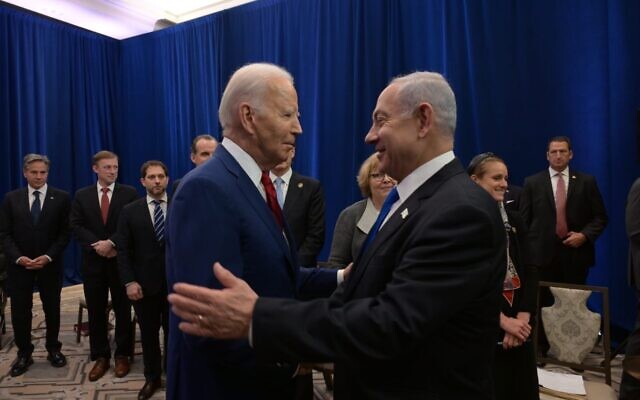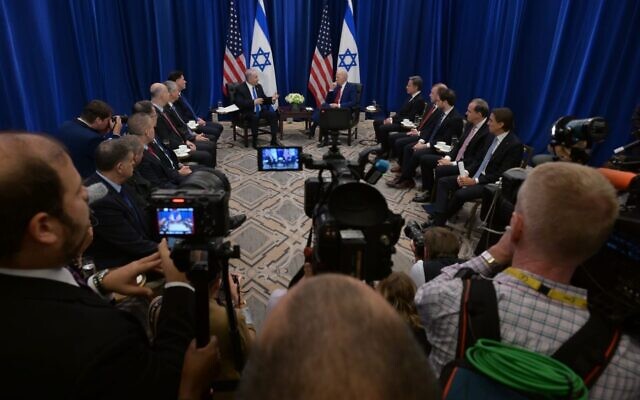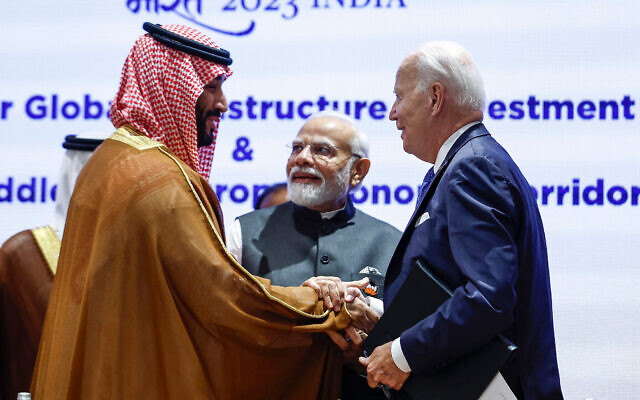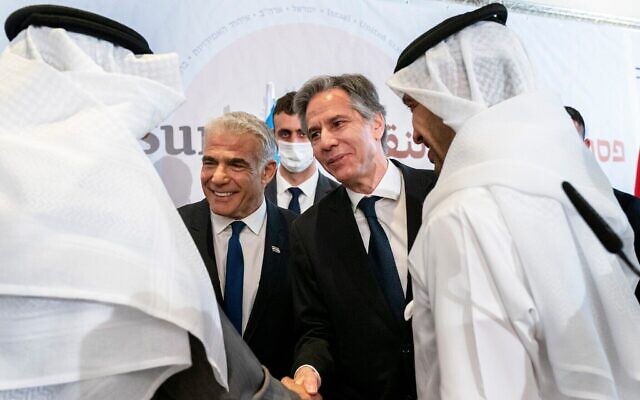When Bibi met Biden
“We will continue to uphold the values that both our proud democracies cherish..."

(Times of Israel) – US President Joe Biden highlighted the need to uphold “democratic values that lie at the heart of our partnership, including checks and balances in our systems,” as he held a long-awaited meeting with Prime Minister Benjamin Netanyahu Wednesday.
Sitting down with Netanyahu for an hour in New York, where the two leaders were attending the United Nations’ annual high-level meeting, Biden also spoke with optimism about the prospects of achieving a deal to normalise relations between the Jewish state and Saudi Arabia.
As the two met inside the Intercontinental Barclay hotel in Midtown Manhattan, hundreds of people, many of them Israeli, rallied noisily on the sidewalks outside against Netanyahu, whose government is pursuing changes to the country’s judiciary that would gut its oversight of executive and legislative powers.
Biden and his senior aides have been vocal about their concerns surrounding the Netanyahu government’s attempts to overhaul Israel’s judiciary, and the domestic fight it has sparked.
The Israeli leader, who has recently appeared to back away from passing judicial reforms without opposition buy-in, assured Biden before the cameras that “Israel’s commitment to democracy” will never change.
“We will continue to uphold the values that both our proud democracies cherish,” he promised Biden in public remarks before the meeting.
A senior Israeli official later told reporters that Netanyahu assured Biden during the private segment of their meeting that he wants to secure consensus support either in the Knesset or among the public.
According to a White House statement, Biden reiterated to Netanyahu “his concern about any fundamental changes to Israel’s democratic system, absent the broadest possible consensus.”
Netanyahu offered the US similar assurances earlier this year, but nonetheless allowed his hard-right coalition to pass a first piece of the overhaul package without any support from the opposition.
In the public statement at the start of their long-awaited bilateral meeting, Biden also referenced other “hard issues” the two would discuss, including preserving the path to a two-state solution, and “ensuring that Iran never, never, acquires a nuclear weapon.”

“Because even where we have some differences, my commitment to Israel, as you know, is ironclad,” continued Biden.
As the two teams greeted each other at the start of the meeting, Biden indicated that he would be hosting Netanyahu at the White House later this year.
“Hello my friend, welcome, welcome, welcome, welcome,” said Biden, “and I hope we’ll see each other in Washington by the end of the year.”
The White House later confirmed that Netanyahu had been invited to Washington before January, though no date was given.
The prime minister had been angling for a White House invite since he returned to office in December, but Biden refrained from doing so amid American dissatisfaction over the judicial reform and the influence of the Israeli far right in the current Israeli government.

Saudi ties at the top of the agenda
A senior Israeli official downplayed the impact of the overhaul issue on the conversation, saying Israeli normalisation with Saudi Arabia had been the focus of the meeting. A White House readout did not mention Israel-Saudi normalisation, but did discuss regional integration.
In front of the cameras, however, Biden appeared upbeat on the prospects of Israel and Saudi Arabia becoming allies. “I suffer from, oxymoron, Irish optimism,” the president said. “If you and I 10 years ago were talking about normalization with Saudi Arabia, I think we’d look at each other, like, Who’s been drinking what?”
Speaking after Biden Netanyahu said: “I think that under your leadership, Mr. President, we can forge a historic peace between Israel and Saudi Arabia.
“And I think such a peace would go a long way first to advance the end of the Arab-Israeli conflict, achieve reconciliation between the Islamic world and the Jewish state, and advance a genuine peace between Israel and the Palestinians.”

Netanyahu rarely brings up a peace process between Israel and the Palestinians, but the Biden administration has made clear to Israeli officials that moves benefiting Palestinians will likely be needed before any deal with Saudi Arabia can go ahead.
After the meeting, a senior Biden administration official said Netanyahu understands that he’ll “have to do some very hard things” including “some component related to the fundamental issue between Israelis and Palestinians” in order to get a normalisation agreement across the finish line.
Netanyahu has in the past sought to publicly downplay the centrality of a Palestinian component to the agreement, as he has long chafed at making concessions to the Palestinians and is now limited by a hardline coalition that overwhelmingly opposes a two-state solution.
A senior Israeli official said after the meeting that Netanyahu would not consider swapping out coalition partners in order to reach a deal with Saudi Arabia, but was open to including any new members who accept the principles of the coalition (an unlikely scenario).
Underlining the domestic pressures Netanyahu is facing, hours before the meeting, 12 MKs from his Likud party published an open letter warning him against making concessions to Saudi Arabia in US-brokered normalisation talks.
“We will agree to peace only in exchange for peace,” the letter said amid reports that Riyadh was demanding major concessions to the Palestinians. There can be “no concessions on the homeland,” continued the letter.
Nonetheless, the senior Israeli official said there was a “good chance we will succeed” in finding a path to an Israel-Saudi normalisation deal, giving it 50.1% odds.
“They agreed to move forward with working teams. The focus was on how to advance the deal, not whether to. They went into a lot of detail.”
The official said there was “full coordination” between Israel and the US on the issue of a Saudi civilian nuclear program. Riyadh has reportedly asked the US to green-light its development of a civilian nuclear program in exchange for the kingdom normalising relations with Israel.
Israel has long opposed such a move if it includes uranium enrichment on Saudi soil.
The senior official also said Netanyahu told Biden that “Palestinians should be part of the process, but shouldn’t have a veto over the process.”
Palestinian tensions, Iran and more
According to the White House, Biden expressed concern over the effect West Bank violence has on the chance for Israel-Palestinian peace.
“With regard to ongoing tension and violence in the West Bank, [Biden] emphasised the need to take immediate measures to improve the security and economic situation, maintain the viability of a two-state solution, and promote a just and lasting peace between Israelis and Palestinians,” the US readout said.
The White House also said Biden urged Israel and the Palestinians to adhere to their commitments made at a pair of regional summits earlier this year in Egypt and Jordan where they agreed not to advance any unilateral measures that exacerbate tensions.

Biden and Netanyahu agreed to work toward convening a third summit between Israel, the Palestinian Authority, the US, Egypt and Jordan in the near future, the White House said.
The US readout said the two leaders also welcomed “the likely convening soon of a ministerial meeting” of the Negev Forum — which brought together Israel, the US and Jerusalem’s Arab allies — which Israeli officials have said will be held in Morocco next month. However, the earthquake that recently hit the country may again cause a delay of the gathering.
Netanyahu praised Biden’s efforts to prevent Iran from attaining a nuclear weapon, though his government is at odds with the White House over how to tackle the issue.
The prime minister urged the US to adopt a more aggressive posture: “That shared goal of ours can be achieved by a credible military threat, crippling sanctions and supporting the brave men and women of Iran who despise that regime and who are our real partners for a better future.”
The meeting started more than 30 minutes late, with Biden wearing a red tie in solidarity with automobile workers on strike.
The two started their meeting with a one-on-one sit-down, then brought in their aides. In all, the meeting lasted about an hour.
Among those present on the US side were Secretary of State Antony Blinken, Assistant to the President for National Security Affairs Jake Sullivan and Amos Hochstein, Biden’s senior adviser for energy and investment who negotiated the maritime border deal between Israel and Lebanon and who is also involved in the talks with Riyadh.
On the Israeli side were Strategic Affairs Minister Ron Dermer and Ambassador to the US Michael Herzog. Dermer was key to negotiating the Abraham Accords during his time as ambassador to Washington.
Netanyahu, who is on trial for corruption in Israel, is in New York for several more days, with his scheduled speech at the United Nations only taking place on Friday. While there, he is expected to be followed by protesters who have rallied against him daily during his nearly week-long trip, including during a meeting with Tesla CEO Elon Musk in San Francisco earlier this week.
Many of those demonstrating outside the hotel had come from Israel, though local ex-pats and non-Israeli US Jews also took part in the rally.
During the meeting, crowds outside chanted “We’re not afraid,” “Shame,” and “We’ll never give up.”
As an organiser announced to the audience that Biden had stressed the importance of democracy to Netanyahu, applause erupted from the crowd.

comments